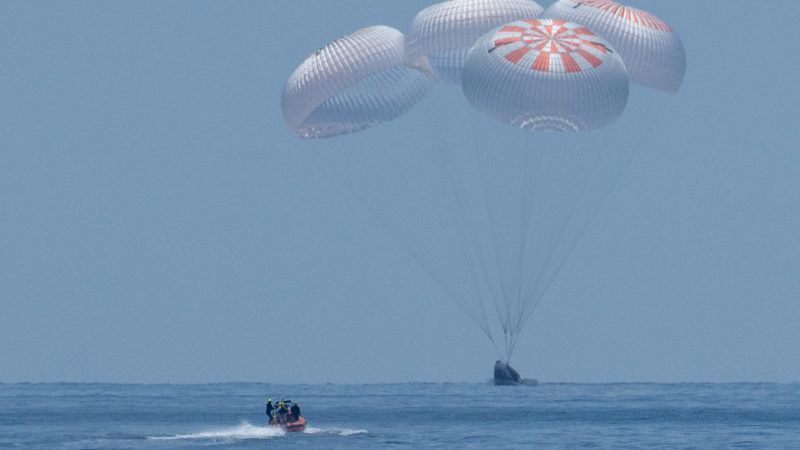Manned SpaceX Capsule Returns From Orbit Without a Hitch
Two American astronauts splashed down to Earth after over 60 days aboard the International Space Station

"Thanks for flying SpaceX," announced SpaceX engineer Michael Heiman as the company's Crew Dragon capsule careened into the Gulf of Mexico on Sunday afternoon. American astronauts Robert Behnken and Douglas Hurley parachuted into the sea off the coast of Pensacola, Florida, after spending two months in orbit around the earth.
The splashdown concluded NASA's Demo-2 demonstration flight with SpaceX, the aerospace company founded by Elon Musk. The flight began on May 30, when the astronauts were launched by SpaceX's Falcon 9 rocket from the Kennedy Space Center in Florida to the International Space Station (ISS).
The Demo-2 mission was intended to showcase SpaceX's readiness for manned space flight. "I think we're surprised—minorly surprised, but obviously incredibly pleased—that this went as smoothly as it did," said Chief Operating Officer Gwynne Shotwell.
The SpaceX trip marks a historic milestone as the first splashdown since the Apollo-Soyuz Test Project with the Soviet Union returned to the earth in 1975. (A splashdown is a method of landing a spacecraft by parachuting into a body of water.)
The Demo-2 flight is also the first trip to space from American soil since NASA's last space shuttle mission in 2011. Since then, NASA has relied on Russia for access to the space station, which was a pricey arrangement. The cost per seat rose from $21 million in 2008 to almost $90 million for a planned mission this October.
The successful return of the Crew Dragon spacecraft could reduce America's dependence on Russia to carry out research in space (a seat on the Crew Dragon will cost just $55 million) and bodes well for the future of private space travel. SpaceX expects to launch its next crewed mission, Crew-1, "no earlier than late-September," according to a NASA press release in July.
That mission will carry four astronauts for a six-month stay at the ISS. It will be the first of at least six trips under SpaceX's $2.6 billion contract with NASA. Boeing, which was awarded $4.2 billion by the space agency, will perform another unmanned test of its CST-100 Starliner system. Its first trial earlier this year revealed serious software errors. Other private companies to receive NASA contracts include Alabama-based Dynetics and Jeff Bezos's Blue Origin.
NASA is embracing these public-private partnerships' enormous cost-saving potential. "This is the next era in human spaceflight, where NASA gets to be the customer," said NASA administrator Jim Bridenstine just before the capsule landed. "We want to be a strong customer, we want to be a great partner. But we don't want to be the only ones that are operating with humans in space."


Show Comments (18)